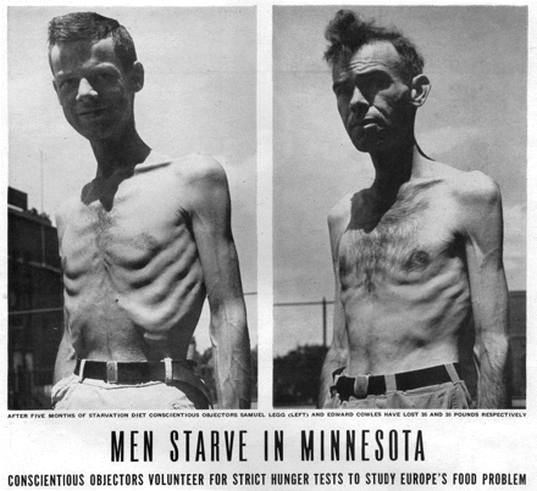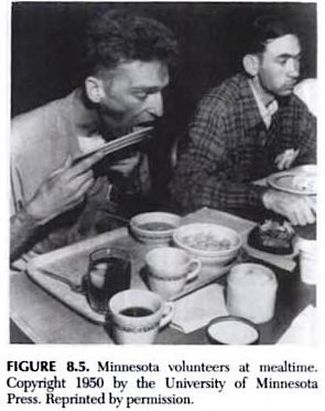Shortly after the start of the experiment, the men quickly how realized how difficult it may be to take part in this study, as the predictable signs and symptoms crept in: constant hunger, decreased body temperature, lack of libido, and a total inability to think of anything but food. A large part of their mental energy - even in their dreams as they slept - was inexorably devoted to food and hunger. There was self-mutilation, depression, anxiety, and in one man, a desire to be infected by tuberculosis simply for the opportunity to be fed and satiated once again in the hospital.
One man in particular, offered a chilling expose of what it was like to live on such little food:
"How does it feel to starve? It is something like this: I'm hungry. I'm always hungry - not like the hunger that comes when you miss lunch but a continual cry from the body for food. At times I can almost forget about it but there is nothing that can hold my interest for long. I wait for mealtime. When it comes I eat slowly and make the food last as long as possible. The menu never gets monotonous even if it is the same each day or is of poor quality. It is food and all food tastes good. Even dirty crusts of bread in the street look appetizing and I envy the fat pigeons picking at them. No food is wasted and the sight of people wasting it in restaurants is intolerable.
...I'm weak. I can walk miles at my own pace in order to satisfy laboratory requirements but often I trip on cracks in the sidewalk....This lack of strength is a great frustration. In fact it is often a greater frustration than the hunger. I eagerly look forward to the day when I can go upstairs two at a time or maybe run to catch a streetcar.
...Social graces, interests, spontaneous activity and responsibility take second place to concerns of food. I lick my plate unashamedly at each meal even when guests are present. I don't sit near guests, for then it is necessary to entertain and talk with them. That takes too much energy and destroys some of the enjoyment that comes from my food. I no longer have that ardent desire to help millions of starving people; rather I feel akin to them and hope that I as well as they will benefit from scientific refeeding."
“The major food items served were whole wheat bread, potatoes, cereals, and considerable amounts of turnips and cabbage. Only token amounts of meats and dairy products were provided." But what is most striking is how much food they were given to eat: 1570 calories per day.
1570 calories a day, which is 130 calories more than the globally recommended caloric intake for a 5'3", 200 pound sedentary female with a BMI of 35.5 told to lose 1 pound per week, according to the widely accepted Mifflin-ST Jeor equation.
How did the caloric intake of a “starvation diet” almost 70 years ago become the standard of care today?
Reading through the Biology of Human Starvation, the similarities from the Minnesota Starvation Experiment and the stories from those that have registered for AWLR are just incredible. Many of those who have registered, detailed what it was like to eat a low fat, low calorie diet before they began their new way of eating.
Body Temperature
As one subject described in 1944:
"I’m cold. In July I walk downtown on a sunny day with a shirt and sweater to keep me warm. At night my well fed room mate, who isn’t in the experiment, sleeps on top of his sheets but I crawl under two blankets.”
And from AWLR:
“I was cold even in the Florida summer, I could see all the veins in my hand, and I almost passed out during a training session at the gym.”
“I was hungry all the time; I obsessed about food to the point that I planned every meal for several days in advance. I felt cold much of the time, especially at night.”
Skin
As Ancel Keys explained:
“At 23 weeks…19 of the 31 subjects had developed brownish patchy pigmentation of the skin" and "[a] dry and scaly skin…was reported for 15 of the 31 subjects during the twenty-third week of semi-starvation."
From AWLR:
"AND, MY SKIN has improved 300%. I used to have some brown skin tags on my face and shoulder and a large one on my scalp. Low carb diet has made them FALL off, effortlessly.”
"Even the rough skin on the heels of my feet smoothed away!"
--
People are universally hungry on a low calorie diet. We need to start listening to the people consuming these diets, and how it makes them feel, instead of blaming the patient and blindly citing the USDA’s dietary guidelines, which is molded by vicious lobbying interests and political partisanship. The food industry has a direct and powerful influence on the USDA and the dietary guidelines. If you don't believe this, read Dr. Nestle's Food Politics. If you don’t believe her, you can look at what happened when the USDA recently decided to begin an interoffice “Meatless Mondays” as a way of reducing their environmental impact. What followed was an outraged president of the National Cattleman’s Beef Association condemning this idea. In response, the USDA retreated with its tail between its legs.
And why does the United States Department of Agriculture, whose mission is to “keep America’s farmers and ranchers in business,” have any say in what we are supposed to be eating? Can someone say conflict of interest?
Despite all this, in the end we can only hope that the truth will prevail. As people register from all over the world and cast their vote for or against the potential benefits of removing grain, wheat, and sugar from their diet, the real effects (at least according to our self reported data) will slowly reveal themselves.
--
Tried a paleo or low carb diet? Join Today and contribute to a better understanding of this way of eating!
View our Marketplace of paleo and low carb experts that compete against eachother to help you lose weight and get healthy!


 RSS Feed
RSS Feed
